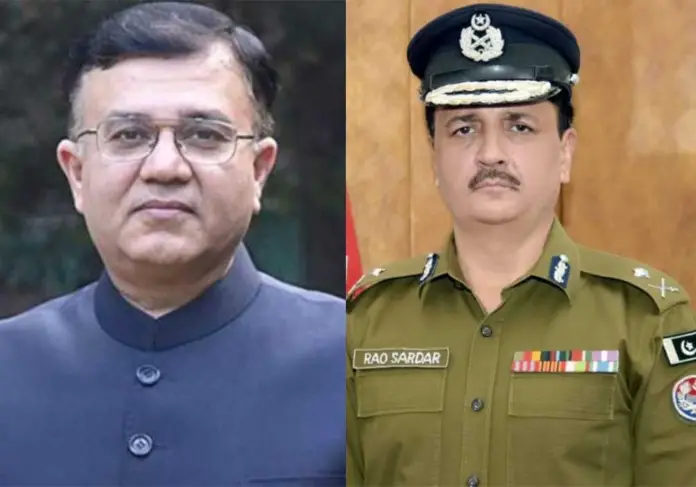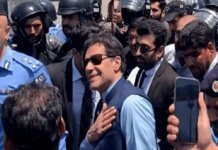The much-expected Punjab Chief Minister Chaudhry Parvez Elahi-led provincial assembly’s Privilege Committee has the legal authority to sentence both the chief secretary and the Punjab Police inspector general (IG) on charges of their ‘felonious’ role to favour a political party during an election for the slot of the provincial chief minister. It may only frame charges against both the top officers, as they had illegally invaded, as Speaker Parvez Elahi alleged, the provincial legislative house for the first time in its entire history. It was also the first incident in the democratic history of the province. However, the province had no lawful authority to take action against federal service officers.
The role of the bureaucratic doyens during the PTI’s long march also raised the eyebrows of many. Many circles, especially the lawyers’ community, civil society, and others, had expressed concerns over their unlawfully ferocious behaviour against the agitators and their peaceful family members. Both the officers had been posted by former premier Imran Khan-led federal government.
It goes without saying that both the top-grade officers are to be relinquished from the province very soon. A former secretary law & parliamentary affairs told this paper on the condition of anonymity that the Punjab Assembly’s privilege committee may also summon them. If there were enough shreds of evidence, after framing charges and hearing them in person, it may declare them guilty of trespassing and brutally playing to get Hamza Shehbaz elected as the chief minister. Certainly, Prime Minister Shehbaz Sharif was supervising this whole show to smash the PTI and the PML-Q in the assembly. However, the PA had no power to penalise these officers. It can only write to the federal government to act under the relevant laws.
After the by-poll results surfaced and the predicted change of command in the province is more visible, the voices against the chief secretary and Inspector General Police, for their alleged conduct in the chief minister’s election, are echoed showing the egotistic wrath of MPAs and party activists against the bureaucracy.
Muhammad Umair, a political worker, said that some political activists of the PTI have demanded the imposition of Article 6 on the said officers, others said they should be trialed under service and conduct rules as they have violated them vehemently.
There are allegations of a lucrative lease award to the brother of the chief secretary without open auction in 2006 as reported by the Auditor General of Pakistan in 2016. An officer said that it was a violation of Islamabad Land Disposal Regulations, 2005 that all commercial and business plots shall be sold or leased out through open auction including hotels and restaurants.
Moreover, an incident that jolted the provincial population occurred in Murree which claimed many precious lives. A high-powered committee was constituted that presented its findings but none of the responsible officers could be punished by the chief secretary-led administration. One after the other got posted and there was no justice! Chief Secretary Afzal’s role in covering manholes after the tragic incident of Faisalabad, which claimed the life of a minor, should be lauded though. His interference and monitoring of the grave issue proved a success story across the province.
When this newspaper investigated the issue of the role of both administrative and police heads and why they acted against law; it surfaced that there was no protection for civil servants. The same had been noted by the apex court in the Anita Turab case. The court had observed that the civil servants had been considered personal servants by the political masters. Those who follow rules; upheld merit and refuse to obey illegal orders are, either, transferred or punished by posting as OSD. Political interference and nepotism are on the rise during postings and transfers of officers. This plight of officers compelled the court to call upon the Establishment Division to submit strategies to protect civil servants under articles 9 and 18.
It would be relevant to mention here that CS Kamran Ali Afzal is the fifth chief secretary in three and half years of the PTI tenure while Sardar Ali will be the seventh IGP.
During the last days of the Buzdar government, a letter was written to the federal government to replace both the chief secretary and IGP with new officers. Buzdar wanted to post Abdullah Sumbal, currently serving as ACS, as the new CS, but he refused. Had there been a protection to the chief secretary’s tenure, he would never have opted to play in the hands of any Hamza!
If the PTI government is truly sincere to reform the existing anomalous system, the need, as lawyer Asghar Ali said, is to implement the apex court’s ruling in Anita Turab Case, instead of imposing Article 6 on the top duo. Only tenure protection can work wonders more than the threat of Article 6.
An officer whom the PMLN government had surrendered from Punjab said that the need is to shelter the acts of officers who go by the book. All the discretionary powers enjoyed by the chief executives of provinces and the federation should be withdrawn and all OPS appointments and rehiring after superannuation should be banned. There should be no concept of suspending or superseding an officer without holding a regular inquiry, there should be no out-of-turn promotions for officers, and, above all, the appointments of the public sector agencies, corporations and companies’ heads like managing directors, presidents and chief executive officers should be made through the Federal Public Service Commission or the PPSC. The need is to review the trimming of the latter’s powers by the Buzdar administration. Moreover, the PTI government should also execute the Directory Retirement Policy 2020 that it had introduced earlier.
When contacted, a secretary on the condition of anonymity said that politicians have been pressuring officers for illegal favours and any refusal costs inverse. The official cited the names of former Senior Member Board of Revenue Nadeem Ashraf and Federal Secretary Power Division Irfan Ali who had to bear the brunt of standing firm against political pressure.
The tussle between ex-Higher Education Minister Syed Raza Ali Gillani and the then HED Secretary Capt (r) Naseem Nawaz, former Irrigation Minister Yawar Zaman and former secretary Capt (r) Saif Anjum and many more incidents may be quoted where politicians pressurized upright officers for some political gains.
When differences erupted between the then secretary of livestock and dairy development department Nasim Sadiq and his parliamentary secretary Arshad Jutt, it created an untidy working environment in the department.
Khyber Pakhtunkhwa Chief Secretary Amjad Ali Khan was repatriated to Islamabad due to complaints from the provincial ministers. A dispute between former Sindh CM Qaim Ali Shah and Chief Secretary Sajjad Saleem Hotiana also flashed when the CS refused to leave the office until the federal government directed it. The transfer of former IGP Sindh Allah Dino Khawaja by the PPP government and the court’s interference could be another example. A school teacher in Sargodha was beaten up and his legs were fractured by an influential member of PML-N; when the DPO took legal action against the culprits, he was transferred to Gilgit as a punishment for his good work. A law officer of the irrigation department namely Tariq Niazi was transferred from Lahore to DG Khan, a remote city, as he refused to obey the illegal orders of the law minister, said a source.
Moreover, TT Singh’s DCOs Waqas Alam, Ahmad Khawar Shahzad, Faisalabad DCO Noorul Amin Mengal and many more had to suffer due to political transfers and then faced ‘political proceedings’ in the Privilege Committees. Former state minister Rana Afzal Khan and Amjad Ali Javed MPA had moved motions against officers upon refusal to obey their illegal orders.
The publicly reprimanding of Assistant Commissioner Sialkot Sonia Sadaf by Firdous Ashiq Awan, the then adviser to PM on information, was another transgression of the conduct of a politician.
The PTI should look into these conflicts that have become common in the public sector. Buzdar’s government was no exception.
There should be a strategy to cater to them and it would be more effective than imposing Article 6. The policymakers who often assert to change the ‘thana culture’ should realise that the elite of the society often exercises outsize control over the system. The need is to make postings against coveted positions like the CS, IGP offices and others without political connections, duly tracking service records, and then protecting their tenure, come what may. Otherwise, this messy system would continue to hook the impecunious stratum and those living below the poverty line. Otherwise, the public wrath may lead society to a Sri Lanka-like cataclysm.
It may be remembered by government officials that under Nuremberg Principle, no officer pursuant to the orders of his government or a superior relieves him from responsibility under the law. CS Afzal was not available to respond to queries sent to him.







